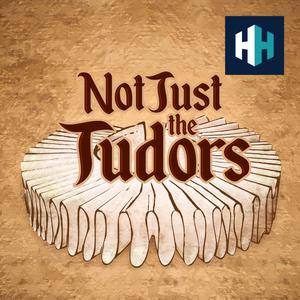
Footnoting History
Footnoting History
- 16 minutes 33 secondsHistory for the Holidays 2024
(Hosts: Christine, Josh, Kristin)
As the year comes to a close, holidays abound! Join us for our newest episode in our series about history that ties to these festive times.
For further reading suggestions and more, please visit: https://www.footnotinghistory.com
7 December 2024, 5:01 am - 15 minutes 47 secondsA Royal Son: Eustace, Count of Boulogne
(Host: Christine)
When England's King Henry I died in 1135, his nephew Stephen usurped the throne. Had Stephen's reign been an accepted success, his son Eustace would have been recognized as the next in line to become king, but that did not come to pass. Here, Christine recounts Eustace's story, from growing up during a period called 'The Anarchy' to the aftermath of learning he would never wear the crown.
For further reading suggestions and more, please visit: https://www.footnotinghistory.com
23 November 2024, 5:01 am - 24 minutes 6 secondsThurkill’s Excellent Adventure: A Medieval English Peasant’s Tour of Hell
(Host: Kristin)
Hundreds of years before Dante took us on a tour through the afterlife, there was Thurkill, an English peasant from the 13th century, who described his journey into hell and the edge of paradise. What was it like and what can we learn from his story? Come on a vision quest with Kristin, in this episode of Footnoting History!
For further reading suggestions and more, please visit: https://www.footnotinghistory.com
9 November 2024, 5:01 am - 16 minutes 3 secondsHistory for Halloween XI
(Hosts: Christine, Lucy, Kristin)
Spooky season is here again! To celebrate we have another selection of historical frights just for you.
For further reading suggestions and more, please visit: https://www.footnotinghistory.com
26 October 2024, 4:01 am - 15 minutes 28 secondsHow to Avoid the Death Penalty in Medieval England, Part II
(Host: Samantha) Not everyone who received the death penalty in medieval England was actually killed. Picking up where she left off in our last episode, Samantha explores two more methods of avoiding execution: gaining sanctuary and buying pardons.
For further reading suggestions and more, please visit: https://www.footnotinghistory.com/
12 October 2024, 4:01 am - 8 minutes 51 secondsHow to Avoid the Death Penalty in Medieval England, Part I
(Host: Samantha) In medieval England, just because you received the death penalty for your crimes doesn't mean you necessarily had to actually die. Here, Samantha looks at two methods of avoiding having your sentence carried out: benefit of clergy and turning to outlawry.
For further reading suggestions and more, please visit: https://www.footnotinghistory.com/
28 September 2024, 6:11 pm - 26 minutes 29 secondsSo You've Been Elfshot
(Host: Kristin) Oh no, you’ve been shot by an invisible arrow and now you’re sick. What’s a person to do? Don’t worry, we’ve got you covered this week with cures for those times when you’ve been elfshot, this week on Footnoting History.
For further reading suggestions and more, please visit: https://www.footnotinghistory.com
14 September 2024, 4:01 am - 17 minutes 39 secondsNapoleon Bonaparte and the Malet Coup
(Christine) In 1812, while France’s Emperor Napoleon Bonaparte was on a military campaign in Russia, he learned of trouble back home: General Claude-François de Malet and several co-conspirators had tried to take control of the French government. Part of their plan centered around telling people that Napoleon had died - except, of course, he hadn’t. Learn all about the attempted coup from Christine in this episode.
For further reading suggestions and more, please visit: https://www.footnotinghistory.com/
31 August 2024, 4:01 am - 15 minutes 22 secondsThe Adventure of Cabeza de Vaca
(Josh) In 1527, Álvar Núñez Cabeza de Vaca set off as a part of the Narvàez Expedition to conquer Florida. The expedition ended in disaster for the Spanish after several encounters with Native Americans defending their lands. Using makeshift boats, Cabeza de Vaca and a handful of other survivors drifted across the Gulf of Mexico before landing near modern day Galveston, TX. Cabeza de Vaca and three other men would spend the next 8 years wandering what is now the Southwestern United States. Come learn about their voyages on this episode of Footnoting History.
Visit FootnotingHistory.com for further reading suggestions and additional information.
17 August 2024, 4:00 am - 12 minutes 48 secondsMedieval Midwives Beyond Myths
(Host: Lucy)
Who were medieval midwives and what did they do? As imagined in novels and films, the medical expertise of such women might be secret, mystical, persecuted, or some combination of all three. In the archives, traces of their activities can be tantalizingly hard to find. This podcast looks not only at the history of midwives in medieval Europe, but at the history of how scholars have tried to recover and reconstruct that history.
3 August 2024, 4:01 am - 23 minutes 14 secondsTales from the Tower of London: Gruffudd ap Llywelyn and Ranulf Flambard
(Hosts: Christine and Kristin)
Since the Middle Ages, the Tower of London has fulfilled many roles including hosting the Crown Jewels. It has, more infamously, also been a prison for many who were viewed as threats or criminals–leading to no shortage of fascinating stories tied to this property. In this episode, Christine and Kristin each share one of their favorite stories about riveting historical figures who found themselves captive in the Tower: Gruffudd ap Llywelyn (son of a Welsh prince) and Ranulf Flambard (the Bishop of Durham).
20 July 2024, 4:01 am - More Episodes? Get the App
Your feedback is valuable to us. Should you encounter any bugs, glitches, lack of functionality or other problems, please email us on [email protected] or join Moon.FM Telegram Group where you can talk directly to the dev team who are happy to answer any queries.
 Tudors Dynasty
Tudors Dynasty
 Gone Medieval
Gone Medieval
 Not Just the Tudors
Not Just the Tudors
 History Extra podcast
History Extra podcast
 Renaissance English History Podcast: A Show About the Tudors
Renaissance English History Podcast: A Show About the Tudors
 Ben Franklin's World
Ben Franklin's World